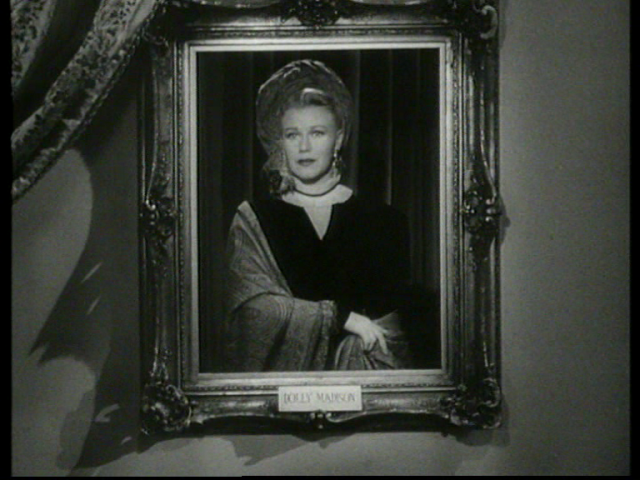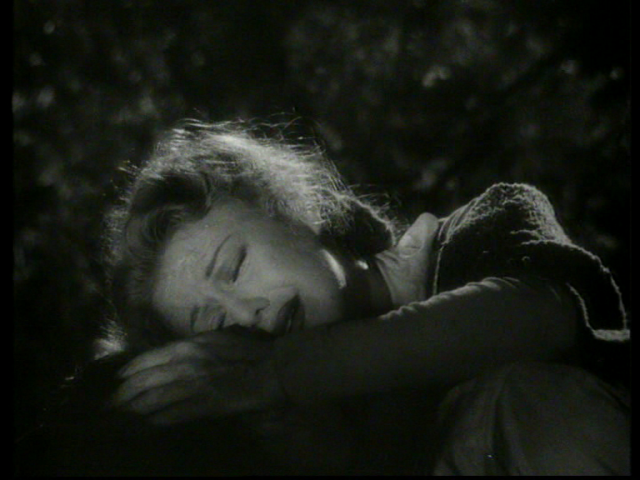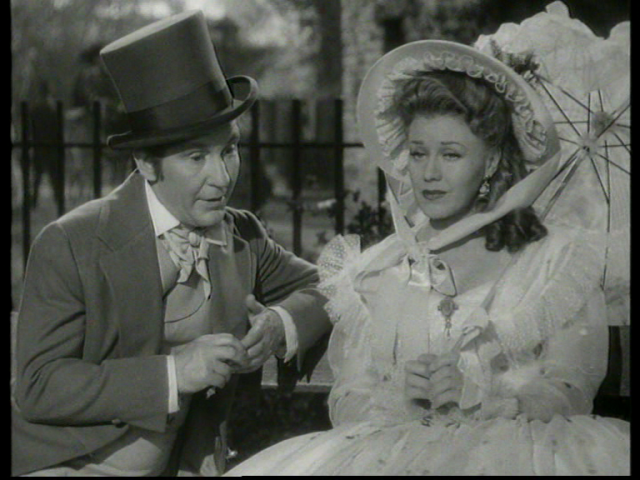
Oddly, when Frank Borzage's oeuvre, most of it long unavailable on home video, started to creep out on DVD, much of what appeared was lesser works from late in his career: no Moonrise, but instead China Doll (1958, released in the UK), and Magnificent Doll (1946, released in Spain). The balance was corrected by the sumptuous Murnau, Borzage and Fox box set (see The Notebook's coverage of that here, here, here, here, here and here).
The Doll diptych would be a doubtful introduction to Borzage's world, but both films are rewarding to the viewer who has already seen a few of the classics. Particularly of note is the way China Doll blatantly recycles a wonderful moment from Street Angel (1928), where the hero holds his cigarette lighter by the heroine's face to see her on a dark night, showing how consistent Borzage's concerns had remained over thirty years.
Magnificent Doll at first seems like the kind of studio assignment the director was sometimes forced to plod through: winsome shit like Seven Sweethearts (1942) or His Butler's Sister (1943), not necessarily terrible, but hardly expressive of the soul's deeper yearnings. And indeed, the material, a hagiography of Dolly Madison, First Lady to James Madison, rather woodenly scripted by novelist Irving Stone (Lust for Life, The Agony and the Ecstasy), does not at first seem the most conducive material. And it isn't.

But but but. Asides from the freakshow weirdness of the casting—Ginger Rogers is Dolly Madison, Burgess Meredith is James, and David Niven is Aaron Burr (!!!)—which makes the thing watchable in a mouth-hanging-open kind of way, we find some real Borzagian feeling at play. The first dramatic event is Dolly's forced marriage, brought about by her father's conversion to Quakerism on the revolutionary battlefield. As the man himself informs us, wounded on the front line, he met an old friend amid the din of war, a Quaker as he had been. The man remarked that God must surely have had a hand in their reunion. At that moment, he's shot down dead, by a bullet that would otherwise have killed Dolly's dad. So dad assumes the faith, and immediately promises his daughter's hand to his old friend's son.
Borzage is probably the most sincere and nuanced religious filmmaker America has seen. His acceptance of sexuality alongside faith, inevitably somewhat quashed after the Production Code's enforcement, adds to his air of simultaneous maturity and joie de vivre. So the themes handed him by this piece of historical embroidery are pretty agreeable. First, he can have fun with the irony of the Rotten Miracle, an apparent divine intervention which leads to her father turning into a colossal jerk. Then he can show Dolly slowly learning to love her genuinely decent new husband. Then the tragedy of his early death, just before she can confess her new feelings for him. And then Irving Stone jumps in and wrecks the moment by having her monologue on about everything we already understand the scene to be about.

The best, and most outrageous, moment, occurs when Dolly believes herself to be in love with Niven's Aaron Burr. When the bashful Madison attempts to woo her, this leads to a circumlocutory dialogue on love, with both parties at cross-purposes: when Dolly speaks of the man she loves, she means Burr, but Madison thinks she means him. Of course, the conceit is swiped wholesale from Cyrano de Bergerac. But it's beautifully played! Burgess Meredith may be Mr. Creepy by nature, and by placing a top hat on his head so often the movie unfortunately recalls for the modern viewer his performance as the Penguin in TV's Batman series, but he captures the suppressed heartbreak of the character's eventual realisation that he is not loved to perfection. Likewise, the scene where he wins Dolly's heart with a speech about freedom is touching and effective democracy-porn.
If Meredith transcends his usual unsavory appeal in places, so do the others, but not consistently. I forget which filmmaker said "Ginger can play anything she can understand," but it's a simultaneous compliment/put-down, and the most extreme interpretations of it are both valid: given a scene she gets, she can be absolutely amazing; but her limits of comprehension do rather seriously circumscribe her abilities. Niven, whose salient virtues are sincerity and light-comedy timing of the highest order, is pretty painfully miscast as the film's conception of Burr: a dangerous demagogue and traitor. Burr's real-life feminism and opposition to slavery are reversed by the script to make Madison seem all the better. But even in Niven's case, there are benefits: struggling to play the character's arrogance and steeliness, Niven imbues him with vulnerability which humanizes the screenplay's two-dimensional character assassination.

Once again, minor films by great filmmakers prove worth discovering.
***
The Forgotten is a regular Thursday column by David Cairns, author of Shadowplay.